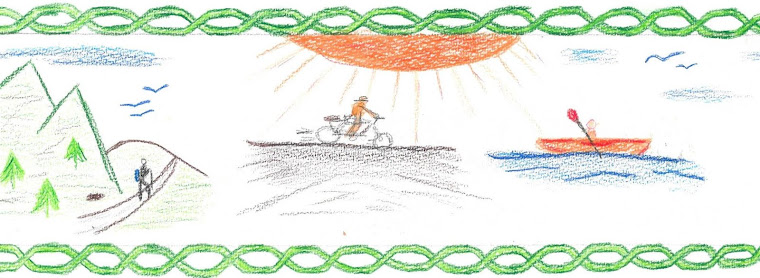| Bontrager SSR Multisport riding shoes with cleats |
Riding
with athletic shoes and normal pedals even served me well on a forty-seven mile
ride on the Great Allegheny Passage, from West Newton to Ohiopyle, with a night’s
worth of camping gear in my rear panniers and strapped to the rear rack. The
three other people I was riding with, however, were wearing cleated riding
shoes. Two of the riders were on touring bikes and wore touring cleats. The
other was on a duel sport bike and wore more athletic shoe looking cleats. I
saw how easily they clipped in and out of their pedals and began thinking
maybe I would give them a try.
At the
beginning of my second year (2015) I stopped by the Trek store where my 3.2 DS
was purchased and saw that most of their cleated riding shoes were on sale. As
I was trying on several pair for fit the clerk said that cleated riding shoes
would either help me ride longer distances, ride faster, or both.
Since I
ride mostly on rail trails, some paved, some packed with crushed limestone,
some dirt, often miles from the nearest
access point or civilization, I wanted a shoe I could comfortably walk in in
case something happened to my bike and I would have to walk a few miles. I
settled on a pair of Bontrager SSR Multisport riding shoes because they looked
more like an athletic shoe than a riding shoe and because they were designed
for multisport riding rather than road cycling.
Since
riding shoes do not come with cleats installed nor work without pedals designed
for cleats, I also purchased and had installed Shimano SPD Pedals and cleats,
but I will say more about the pedals in the next installment.
Riding
shoes do not come with cleats because there are various styles and brands of
cleats made to attach to various brands and styles of pedals. When you purchase
pedals for cleats the cleats will usually come with them and will have to be
attached to the riding shoes. Since my cleats were attached by the retailer
where I bought the shoes and pedals with cleats, I cannot say much about how
easy or not easy it is to attach them.
I have now
ridden over 1,200 miles while wearing cleated riding shoes and I love them. I
do indeed think they have helped me ride farther.
Occasionally, when I have needed a quick burst of speed, they have helped me
ride faster. They have certainly helped me ride up hills with more ease.
Here are
links to previous posts in the series:
Spinning Wheels (Lessons from Two Years of Cycling) Be Kind to Your Behind (Fourth Installment)
Spinning Wheels (Lessons from Two Years of Cycling) Combating Hand and Arm Numbness (Third Installment)
Spinning Wheels (Lessons from Two Years of Cycling): Reading and Riding (Second
Installment)
Spinning Wheels (Lessons from Two Years of Cycling): Starting Over (First Installment)

